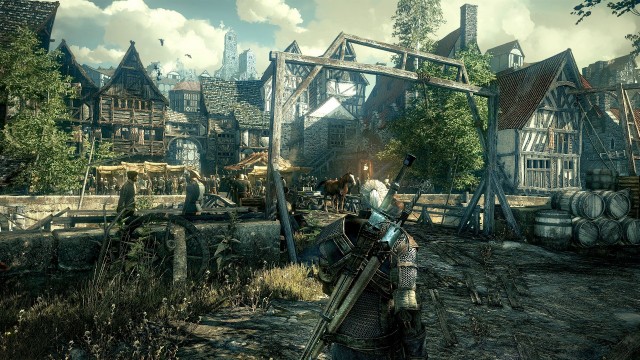
Maybe it’s my fear of the unknown that sways me away from playing open-world games. I take directions, orders, coaching and guidance well enough to at least pretend to interpret the advice. I definitely like exploration, but I hate the feeling of being hopelessly lost, particularly if there’s a pressing matter present. I rarely have the time to experiment with new routes, or try to find somebody to beg for directions. Why risk going wrong when you can prepare for going right?
I’ve changed my stance slightly, thanks to fantastic titles like Fallout 3, Red Dead Redemption and The Elder Scrolls V: Skyrim. How can you not feel completely immersed in these worlds? Despite my initial reservations of not being told what to do (no, seriously, what do I do and where do I go?), I learned to trust myself and embrace the nature of what an open world means: relying on my previous experience and shedding fear of the unknown.
It’s an apt mirror for my life. As I sit here and type out my very last Serotonin, I don’t think of a linear game structure being automatically better than an open-world one, or vice versa. I look at them as two different artistic styles, each trying to evoke an emotional response out of the player. I feel as though I have evolved by growing to appreciate open-world games, but as critics will claim linearity forces a player to obey rather than play, perhaps open-world games lose pacing by letting you do anything at any time.
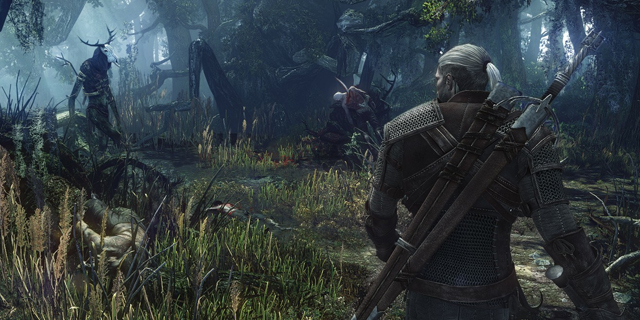
The Witcher 3: Wild Hunt takes literally every single complaint I had about The Witcher 2: Assassins of Kings and changes it. I was shocked at how quickly I was enamored despite how it looked, at a glance, the exact same as The Witcher 2. The opening narration was far more useful at updating me on Geralt of Rivia’s history and where we would join him today. The menus were easier to navigate and, while the inventory is still cumbersome to use, it’s more aesthetically pleasing. I’m not fighting with my eyes to locate a certain item and I know immediately the difference between my stash and my equipped items.
The fighting system is smoother, the difficulty is more fair, they actually remind you of what each spells do (no, I don’t want to start learning another language, just tell me what Quen does!), the quests are vastly more interesting and there’s a drastic reduction in the pace slowing loading screens. I couldn’t have asked CD Projekt Red for more.
But the star of the show is the switch from a linear adventure to a completely open world. The Witcher 2 was hardly Final Fantasy XIII in terms of forced direction, but it’s nowhere near as free as The Witcher 3, and pales in comparison as a result. This is largely due to the profession of the main character, a Witcher, one who travels the land looking for contracts to kill monsters, demons and other disgusting and unspeakable horrors that roam the countryside threatening peasant and nobles alike. Not all those that wander are lost, but it hardly makes sense for a Witcher to stay put in one area for very long. A free agent shouldn’t be tied down.
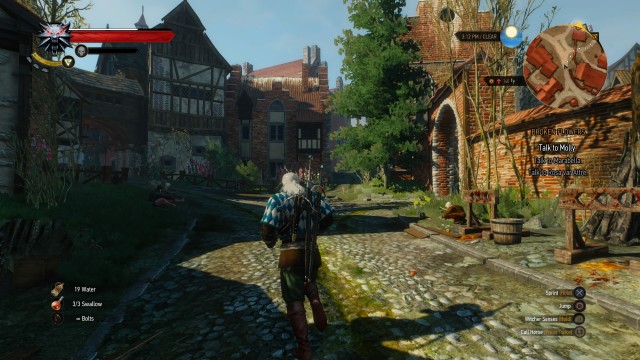
It helps that Velen, Kaer Trolde, Oxenfurt and a slew of other locations are absolutely astounding in detail, intimidating in scope and utterly thrilling to journey across. One of the biggest advantages of an open-world design is the lack of urgency. Players are welcomed to venture nearly anywhere they can and are rewarded with new dialogue, cutscenes, quests, items, monsters and dungeons to explore. There’s nothing necessarily new, to be sure, but the incredible atmosphere is seductive and you’ll have a hard time deciding whether to further the story or go see about that contract for a monster you overheard a guard talking about in a drunken stupor.
One of the locations, the Isle of Fyke, encapsulates my new appreciation of open-world games perfectly. There are a few quests involved on this mysterious island in the middle of a massive expanse of water. There’s nobody living there, but dead opportunist’s bodies litter the shores at the hands of a mysterious force. The discoveries and explanations about what happened to the castle and people are fantastic and full of Witcher series trademarks: twists in a story, engrossing dialogue and a grand dose of gore imagery and chilling implications.
I’ve just completed one of the quests (the game is very liberal about which storyline quests you do, often giving you multiple at a time), and my last conversation before my last save indicated that I was to go there again. I’ve never been happier to be informed of a return trip to a swampy marsh of death. For one, I was eager to return because the location was interesting to visit.
One of the greatest compliments I can give The Witcher 3 is that it’s the first game to actually make me wary of walking in the woods at night. The forests are terrifying when the sun goes down; it’s darker than I’d like and in a game where Geralt can be quickly killed if you don’t devise a quick plan, I like to see what’s coming. Fyke at night was nigh a playable nightmare. Exploding, festering zombie types attacked me without warning. The mists warned me to stay away. The ominous, abandoned castle told me something was in there, but I couldn’t find out from the outside. Having a lamp that allowed me to talk to ghosts ensured my trip would not be without an occult presence. Maybe I should just meditate until morning.
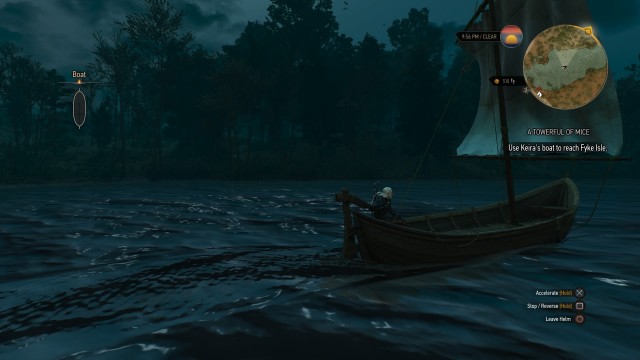
Because of my emotional reaction to Fyke, good and bad, the second I was told I was going back almost felt like a double-reward. One, I was going back. Two, since I’d decided to do that quest earlier, I had advanced knowledge of what he was talking about. The NPC didn’t assume I’d know it, so it made me feel wise and well-travelled. Oh, buddy, I’ve heard of Fyke. You wouldn’t believe what the ghostly daughter there told me.
I don’t enjoy everything about open-world design, though Witcher 3 may be one of the very best and I’m grasping at straws to find criticism. I must be honest: I miss the pacing of a more linear game. Chrono Trigger, a game I hope will never be dethroned as my all-time favorite, has a masterful pace. The design was such that every area of the game meant something and had a purpose involving driving the plot forward. There was never any question as to why you were in a dungeon. You were in the sewers on the way to finding the Epoch, or at the church trying to find the missing queen, or at Death Peak to resurrect a fallen comrade. Despite my lack of choices to drive the narrative, the pacing and rewards given to me for following instructions were so great that I didn’t even notice.
Yet, if I wanted, I could breeze through The Witcher 3 by just focusing on storyline missions. The pacing doesn’t necessarily have to falter. The choices and rewards are so bountiful that this a sandbox many will find themselves combing for hundreds of hours, well beyond the allotted time required to see the end credits. It is a masterpiece, truly.
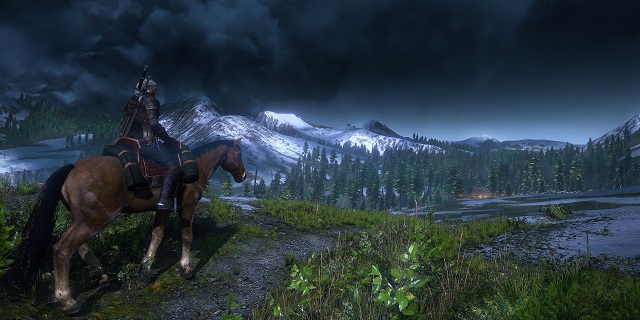
Was it because my life was so much more linear through school that I sought equally designed games? As we approach the end of this column, and life has so many more opening doors at any given second, do I feel the need to emulate that in my digital adventures? Am I more comfortable with the notion that it is up to me where I go from here? Or am I still just dipping my toe in the waters to make sure I can handle the temperature?
I hope I can continue to explore these questions through living my life by keeping healthy, being loyal to my loved ones and playing games. The hobby that started with Super Mario Bros. in Halifax, Nova Scotia and continues on 26 years later with The Witcher 3 in Victoria, British Columbia will remain a core exploratory feature of my psyche for years to come. I hope you’ve enjoyed reading Serotonin and appreciate you taking the time to understand the reason why I play games: to feel. Anger, sorrow, despair, love, grief, shock, dismay, rage, joy, disbelief, frustration, boredom, satisfaction, relief, trust, betrayal and peace. The anticipation of starting a new game, the rush of defeating a formidable foe and the instant nostalgia of finishing a beautiful game. All to get the rush of serotonin.



















